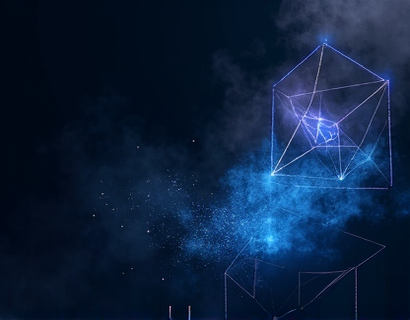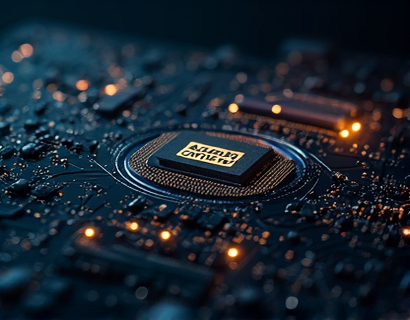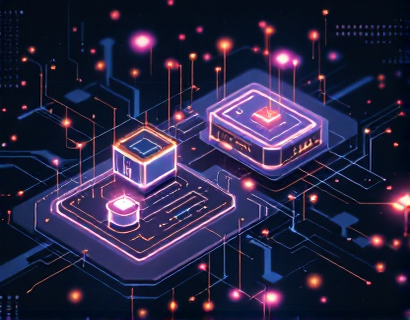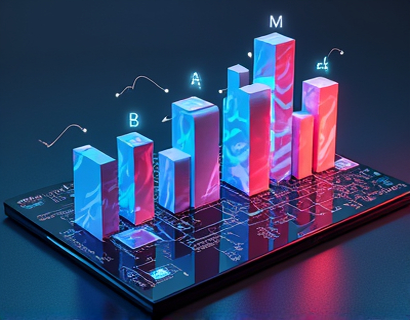Blockchain Oracle Management: Streamlining Data Integration and Smart Contract Execution for Decentralized Applications
In the rapidly evolving landscape of blockchain technology, the role of oracles emerges as a critical component for connecting decentralized applications (DApps) with external data sources. Oracles serve as bridges, providing real-time data and enabling smart contracts to interact with the off-chain world. However, managing these oracles efficiently remains a challenge for developers and businesses aiming to harness the full potential of blockchain. This article delves into innovative software solutions that streamline oracle management, enhance data integration, and boost smart contract capabilities, ensuring secure and reliable interactions in DApps.
Understanding the Role of Oracles in Blockchain Ecosystems
Oracles play a pivotal role in the blockchain ecosystem by facilitating the flow of information between the blockchain and external systems. They collect data from various sources, such as IoT devices, APIs, and databases, and relay this data to smart contracts on the blockchain. Conversely, oracles can also send data from the blockchain to external systems, enabling a two-way communication channel. This bidirectional data flow is essential for the functionality of many DApps, including decentralized finance (DeFi) platforms, predictive markets, and supply chain management systems.
Challenges in Oracle Management
Despite their importance, oracles come with several challenges that can undermine the reliability and security of DApps. One major issue is the trust problem: users must trust the oracle to provide accurate and unbiased data. Centralized oracles, while easier to manage, introduce a single point of failure and potential manipulation. Decentralized oracles, on the other hand, aim to mitigate these risks by aggregating data from multiple sources, but they introduce complexity in data validation and consensus mechanisms.
Another challenge is the latency and reliability of data feeds. Oracles must provide timely and consistent data to ensure the smooth operation of smart contracts. Delays or inaccuracies can lead to incorrect contract executions, resulting in financial losses or system failures. Additionally, the security of oracles is paramount, as any vulnerability can be exploited to manipulate data and compromise the integrity of the blockchain.
Innovative Solutions for Oracle Management
To address these challenges, several innovative software solutions have emerged, focusing on streamlining oracle management and enhancing the overall performance of blockchain services. These solutions aim to provide a robust, secure, and efficient framework for integrating external data into DApps, thereby unlocking the full potential of blockchain technology.
Decentralized Oracle Networks
Decentralized oracle networks are designed to overcome the trust and reliability issues associated with centralized oracles. These networks aggregate data from multiple independent sources, using cryptographic techniques to ensure data integrity and consistency. By leveraging blockchain's inherent transparency and immutability, decentralized oracle networks provide a trustless environment where users can verify the accuracy of data without relying on a single entity.
One approach to decentralized oracle networks is the use of predictive markets, where data providers bet on future data points. The outcomes of these bets serve as a form of crowd-sourced prediction, which is then used to determine the value of the data. This mechanism not only ensures data accuracy but also incentivizes honest participation through rewards.
Data Aggregation and Validation
Effective data aggregation and validation are crucial for the reliability of oracles. Advanced algorithms and machine learning techniques can be employed to filter and process data from multiple sources, identifying and discarding outliers or inconsistent readings. This ensures that the data fed into smart contracts is accurate and reliable.
Blockchain-based consensus mechanisms, such as Proof of Stake (PoS) or Byzantine Fault Tolerance (BFT), can be used to validate the data provided by oracles. These mechanisms require network participants to reach a consensus on the data's validity, adding an extra layer of security and trustworthiness.
Real-Time Data Streaming
To address latency issues, innovative solutions focus on real-time data streaming. By utilizing WebSockets or server-sent events, oracles can push data updates to smart contracts as soon as they are available, minimizing delays. This real-time data flow is essential for applications that require up-to-the-minute information, such as trading platforms and IoT-driven DApps.
Furthermore, edge computing can be leveraged to process data closer to the source, reducing the time it takes for data to travel to the blockchain and back. This approach not only improves response times but also reduces network congestion and costs.
Enhanced Security Measures
Security is a top priority in oracle management. To protect against potential vulnerabilities, solutions implement multi-layered security protocols. These include encryption of data in transit and at rest, secure authentication mechanisms, and regular audits to identify and mitigate risks.
Smart contracts themselves can be enhanced with formal verification techniques to ensure they behave as intended. By mathematically proving the correctness of smart contract logic, developers can eliminate the risk of bugs and unintended behavior that could be exploited by malicious actors.
User-Friendly Integration Tools
For developers and businesses, the complexity of integrating oracles into DApps can be daunting. To simplify this process, user-friendly integration tools and platforms have been developed. These tools provide pre-built connectors and APIs that abstract the underlying complexity, allowing developers to focus on building their applications rather than managing oracles.
These platforms often come with comprehensive documentation, SDKs, and community support, making it easier for developers to get started with oracle integration. Additionally, they may offer monitoring and management dashboards to track the performance and reliability of oracles in real-time.
Case Studies and Real-World Applications
To illustrate the impact of advanced oracle management solutions, let's examine a few real-world applications across different industries.
Decentralized Finance (DeFi)
In the DeFi space, oracles are essential for price feeds, lending protocols, and insurance products. For instance, a DeFi lending platform can use a decentralized oracle network to fetch real-time market prices from multiple exchanges. This data is then used to determine the interest rates and collateral requirements for loans, ensuring fair and dynamic pricing.
A case in point is the integration of a decentralized oracle network with a popular lending protocol, which resulted in more accurate pricing and reduced liquidity risks. The platform saw a significant increase in user adoption and transaction volume, demonstrating the practical benefits of reliable oracle management.
Supply Chain Management
Supply chain management is another area where oracles can add substantial value. By integrating oracles that provide real-time data on inventory levels, shipping status, and product quality, businesses can create transparent and efficient supply chains.
For example, a global retailer implemented a blockchain-based supply chain solution with decentralized oracles to track the movement of goods from manufacturers to stores. The oracles provided real-time updates on shipment locations and conditions, enabling the retailer to optimize inventory management and respond quickly to any disruptions. This not only improved operational efficiency but also enhanced customer trust through increased transparency.
Predictive Markets
Predictive markets leverage oracles to gather data on future events, allowing users to place bets on outcomes. A decentralized predictive market platform used a decentralized oracle network to aggregate data from various sources, including financial markets, social media, and sensor data.
By ensuring the accuracy and timeliness of data, the platform attracted a wide range of participants, from individual bettors to institutional investors. The platform's success was measured by the increased liquidity and the accuracy of its predictions, which outperformed traditional forecasting methods.
Future Trends and Developments
As blockchain technology continues to mature, the role of oracles and oracle management solutions will evolve. Several trends and developments are shaping the future of this space.
Interoperability and Cross-Chain Oracles
With the rise of multi-chain ecosystems, the need for cross-chain oracles becomes increasingly important. These oracles enable data to be seamlessly transferred between different blockchain networks, facilitating interoperability and expanding the scope of DApps.
Protocols like Polkadot and Cosmos are leading the way in cross-chain interoperability, with plans to integrate decentralized oracle networks that can fetch data from multiple chains and provide a unified view for smart contracts.
AI and Machine Learning Integration
The integration of artificial intelligence (AI) and machine learning (ML) with oracle management is another exciting frontier. AI algorithms can enhance data processing and validation, predicting and correcting anomalies in real-time. ML models can also optimize data aggregation by identifying the most reliable sources and weighting their contributions accordingly.
For instance, an oracle network could use ML to prioritize data from sensors with a proven track record of accuracy, ensuring that smart contracts receive the most trustworthy information.
Regulatory Compliance and Trust Framework
As DApps and blockchain applications gain mainstream adoption, regulatory compliance will become a critical aspect of oracle management. Solutions that incorporate compliance features, such as audit trails and reporting mechanisms, will be essential for building trust and meeting regulatory requirements.
Establishing a trust framework that verifies the identity and credibility of data providers can further enhance the reliability of oracles. This may involve collaboration with regulatory bodies and industry standards organizations to develop best practices and guidelines.
Conclusion
Oracle management is a fundamental aspect of building robust and reliable decentralized applications. By addressing the challenges of trust, latency, and security, innovative software solutions are transforming the way oracles interact with blockchain networks. These advancements not only streamline data integration and enhance smart contract functionality but also unlock the full potential of blockchain technology.
For developers and businesses, embracing these solutions is crucial for creating scalable and secure DApps. As the ecosystem continues to evolve, the integration of AI, cross-chain interoperability, and regulatory compliance will further propel the adoption and success of blockchain-based applications.










































